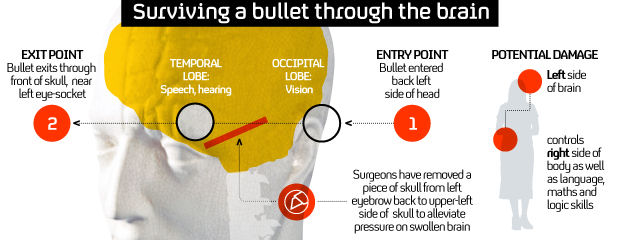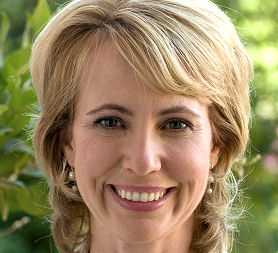Arizona shooting: Giffords ‘100 per cent certain to survive’
One of the doctors treating Gabrielle Giffords tells Channel 4 News she is 100 per cent certain to survive. Dr Peter Rhee says he is also optimistic she will not be in a vegetative state.
- Chapters
- descriptions off, selected
- subtitles off, selected
- captions settings, opens captions settings dialog
- captions off, selected
This is a modal window.
This is a modal window. This modal can be closed by pressing the Escape key or activating the close button.
Arizona Congresswoman Giffords was shot in the head at close range on Saturday.
The attack killed six people including a 9-year old child.
The bullet travelled from the back of Ms Giffords’ brain to the front but remained on the left side.
Doctors say the route of the bullet was crucial to her survival: it did not cross from one side to the other or travel through the geometric centre of her brain.
Her prognosis for survival is 100 per cent as far as it being short term. Dr Peter Rhee
Speaking to Channel 4 News on Monday Dr Peter Rhee, who is treating Ms Giffords, said the outlook was very good: “As a physician I’m going to get into a lot of trouble for this but her prognosis for survival is 100 per cent as far as it being short term.”
“What her recovery is going to do I really don’t know. I’m optimistic however she’s not going to be in a vegetative state.
“I think she’s going to make a fair amount of recovery but what kind of deficits she’ll have in the future I really can’t say but I’m very optimistic.”
In most people the left side controls right-sided strength and also the ability to speak and understand speech.
Doctors have been encouraged since Saturday because Congresswoman Giffords was able to understand simple commands even before surgery.
Speed
Ms Giffords was on the operating table within 38 minutes after she was shot.
Speaking on Sunday Dr Peter Rhee said she had suffered major trauma: “This wasn’t a little grazing wound to the brain this was a devastating wound that travelled the entire length of the brain on the left side.”
Neurosurgeons then carried out what they describe as routine procedures for gunshot victims.
Firstly they controlled the bleeding, which was not too severe. Secondly they took pressure off the brain by removing bone fragments caused by the bullet. Thirdly they removed any dead parts of the brain.

Swelling
Brain swelling is now the biggest threat to Congresswoman Giffords.
When a person is shot in the head doctors can do little to repair the primary injury which is the damage caused by the bullet.
The secondary injury is caused by the subsequent swelling of the brain which can be treated.
“We’ll protect the brain with an artificial layer and then close the scalp over and put the skull back when the brain has relaxed.” Dr Michael Lemole
Doctors say experience from a decade of fighting in Iraq and Afghanistan has helped their understanding of gunshot wounds to the head.
Dr Rhee said: “When the brain swells, it’s like when you sprain your knee and the fluid accumulates, it gets very tense and there’s a tremendous amount of pain.
“The brain will go though the same situation except when it gets tense the blood flow to the neurons and brain cells get compromised.”
Part of Ms Giffords’ skull has been removed so her brain can swell without being constrained.
It is being preserved in hospital and will be re-implanted at a later date.
Dr Michael Lemole operated on Ms Giffords: “We’ll protect the brain with an artificial layer and then close the scalp over it and put the skull back when the brain has relaxed sufficiently.
“That may take several months but each case is individual.”

Timetable for recovery
Doctors treating Ms Giffords are reluctant to give exact time-scales because of the nature of her injury.
Dr Lemole said: “There is a general rule of thumb that the faster you recover the better you recover but that does not apply in all individual cases.
It is not uncommon after these kinds of injuries to be in Intensive Care for at least a week, maybe in hospital for two to three weeks and no doubt there will be a rehabilitative phase and that could take weeks to months.
But Dr Rhee is happy with Ms Giffords’ progress so far: “This is about as good as it gets.
“When you get shot in the head and the bullet goes through the brain the chances of you living are very small and the chances of you waking up and following commands are even smaller so this so far has been a very good situation.
“Hopefully it’ll stay that way…it’s still very precarious at this time.”